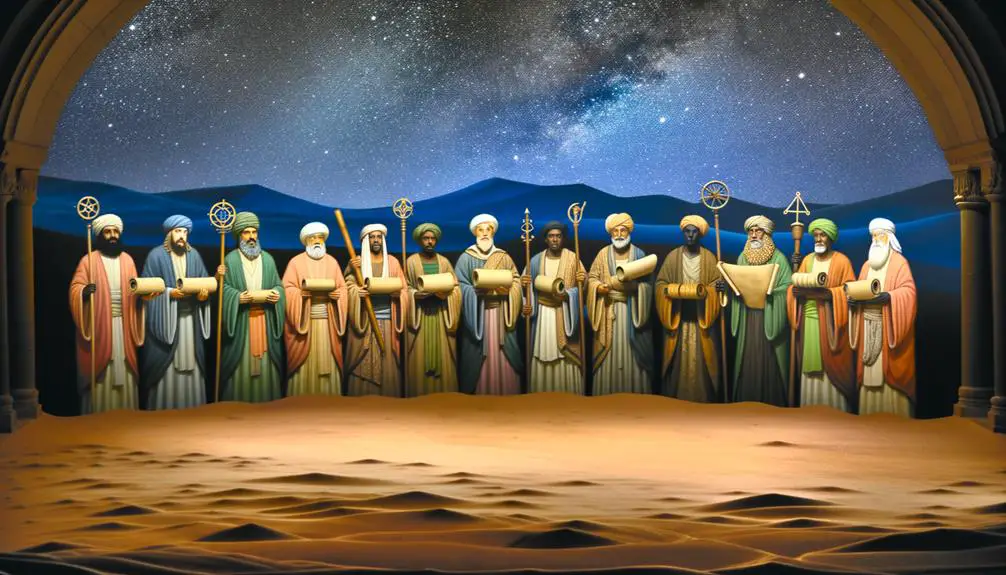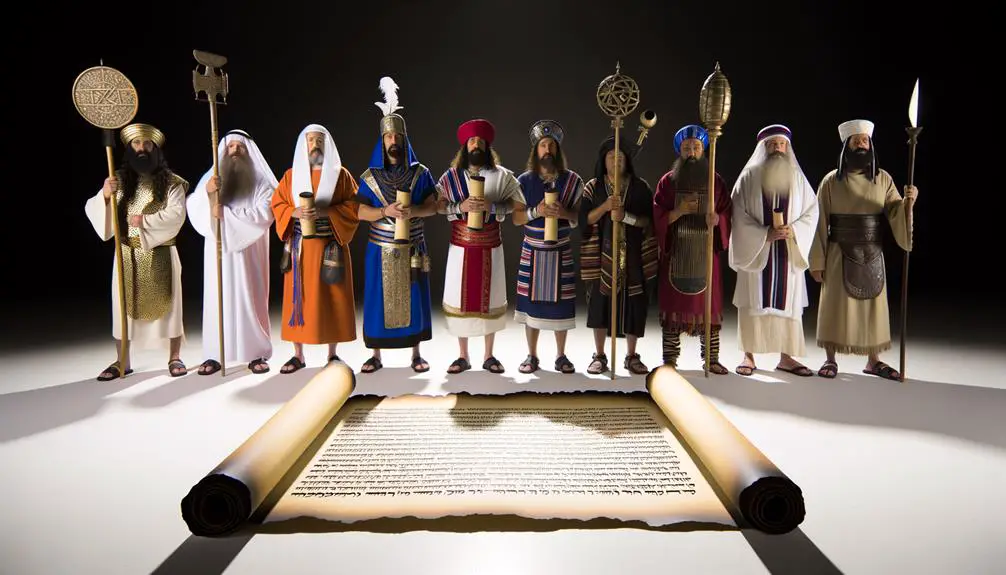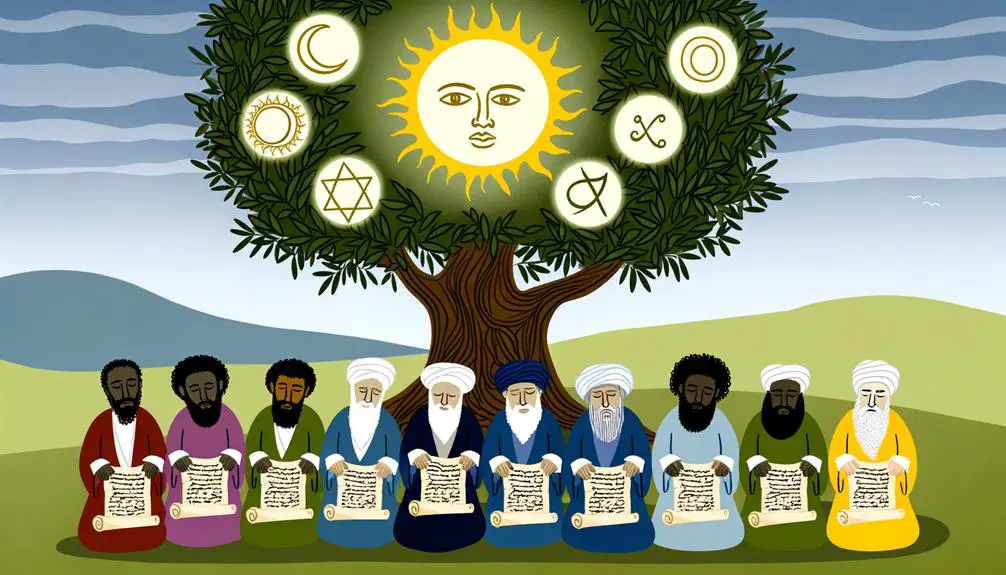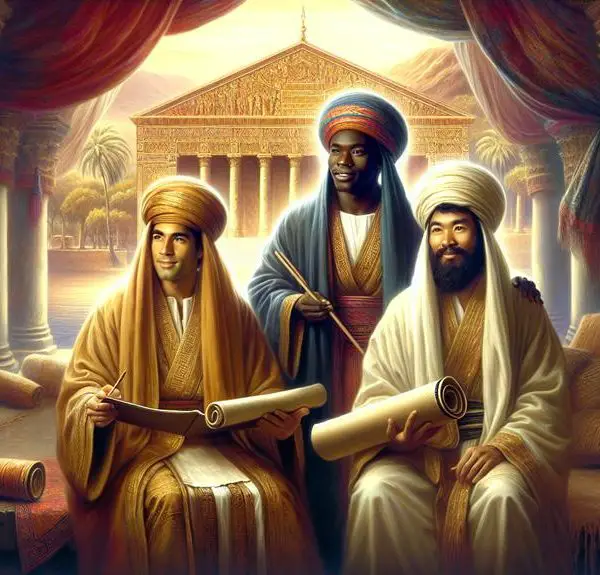Mysterious and wise, the Sons of Issachar's biblical narrative reveals a legacy of insight and strategic prowess, beckoning a deeper exploration.

The Sons of Issachar in the Bible
You might say the Sons of Issachar had a knack for understanding the times, a polite way of noting their profound wisdom and insight.
As you explore their origins, attributes, and the significant role they played in Israelite society, you'll uncover a fascinating blend of biblical mentions and stories that paint a picture of their legacy and symbolism.
Their unique position and skills set them apart, offering a glimpse into their strategic contributions during pivotal moments in history.
This journey into the lives of Issachar's descendants promises to unveil layers of intrigue and significance that have echoed through generations.
Why did they stand out among the tribes, and what can their story teach us today?
Key Takeaways
- The sons of Issachar were known for their deep understanding of times and seasons, crucial for agricultural and military strategies.
- They played a strategic role in Israelite governance, offering wisdom and leadership across generations.
- Descendants of Issachar were integral in cultivating fertile lands and ensuring the prosperity of the Israelite nation through their agricultural expertise.
- Their legacy is marked by contributions to scholarly pursuits, understanding cyclical patterns, and influencing Jewish and Christian thought.
The Origins of Issachar

The tribe of Issachar originated from the fourth son of Jacob and Leah, as documented in biblical texts, embodying a significant lineage within Jewish history. This tribe's emergence is intricately tied to the complex fabric of the Israelite nation, with its roots deeply embedded in the ancestral narratives found in the Torah. The genealogical records play a crucial role in tracing the lineage and establishing the tribal significance of Issachar, underscoring its integral position among the twelve tribes of Israel.
Delving into the genealogical records, you'll find that Issachar's descendants were known for their strong familial ties and adherence to the traditions and laws that governed their society. These records aren't merely lists of names; they encapsulate the social and religious bearings of the tribe, offering insights into the broader context of their historical and cultural milieu. The meticulous preservation of these records highlights the importance placed on lineage and heritage, serving as a testament to the tribe's enduring legacy.
The tribal significance of Issachar can't be overstated. It's woven into the very fabric of Jewish history, reflecting a lineage that contributed to the development and identity of the Israelite nation. Through the analytical lens of genealogical records, one gains a deeper understanding of the tribe's role and its contributions to the collective narrative of the people of Israel. These records not only affirm Issachar's place within the tapestry of Jewish ancestry but also illuminate the interconnectedness of tribal identities, enriching our comprehension of their historical and cultural significance.
Attributes and Skills

Often, members of the tribe of Issachar are celebrated for their exceptional understanding of the times and their adeptness in various skills, highlighting a profound wisdom that influenced their societal contributions. This tribal wisdom wasn't merely anecdotal but was deeply embedded in their culture, distinguishing them among the tribes of Israel. Their skills and attributes were multifaceted, contributing significantly to their identity and the roles they played within the broader Israelite society.
- Astuteness in Understanding Times and Seasons: The sons of Issachar possessed an uncommon ability to discern the times, an attribute that suggests a deep connection to both their physical and spiritual environments. This keen awareness enabled them to make strategic decisions that were crucial for their survival and prosperity.
- Adeptness in Agriculture and Animal Husbandry: Their knowledge extended into practical domains, such as agriculture and the management of livestock. These skills were essential for sustaining their tribe and contributed to their economic stability and growth.
- Numerical Strength and Military Prowess: The tribe of Issachar was known for its numerical strength, fielding a considerable force when called upon. This strength wasn't just in numbers but also in the strategic acumen of their warriors.
- Leadership and Governance: Leaders from the tribe of Issachar were noted for their wisdom and judgment, playing pivotal roles in the governance of the Israelite confederation. Their ability to guide and make prudent decisions was a testament to their tribal wisdom.
The attributes and skills of the sons of Issachar reflect a complex interplay between wisdom, practical knowledge, and leadership, underpinned by their deep understanding of their environment and the times they lived in.
Role in Israelite Society

Within Israelite society, members of the tribe of Issachar played crucial roles, leveraging their deep understanding and multifaceted skills to influence both governance and daily life. Your comprehension of the tribe's impact involves recognizing their strategic positioning within tribal dynamics and their significant economic contributions.
Issachar's integration into the broader societal structure wasn't merely a matter of presence; it was pivotal in the orchestration of collective decisions and actions. They served as advisors and strategists, drawing upon their reputed wisdom and knowledge of the times and seasons. This capability wasn't only beneficial for agricultural pursuits but also for political and military strategies, ensuring the tribe's involvement in leadership and decision-making processes.
Economically, Issachar's contributions were profound. Their territory, blessed with fertile land, became the cornerstone of their economic activities. Agriculture, particularly the cultivation of olives, grapes, and grains, thrived, supporting not just their tribe but also contributing to the sustenance and prosperity of the entire Israelite confederation. Through trade and the sharing of agricultural surplus, Issachar fostered inter-tribal relationships and economic interdependence.
Aspect |
Description |
Impact |
|---|---|---|
Leadership |
Strategic advisors in governance and military |
Influenced decisions, ensured prosperity |
Agriculture |
Cultivated fertile lands, produced essential crops |
Economic backbone for the tribe and beyond |
Inter-tribal Relations |
Engaged in trade, shared agricultural surplus |
Strengthened unity, fostered economic interdependence |
Your understanding of Issachar's role within Israelite society underscores the tribe's essential contribution to the nation's stability, both in governance and economic sustainability, highlighting their indispensable position within the tribal dynamics.
Biblical Mentions and Stories

In biblical narratives, Issachar's tribe is frequently highlighted for its discerning members and strategic contributions, reflecting its significant role in the unfolding events of Israelite history. This tribe, descending from Jacob's ninth son, Issachar, is portrayed as possessing a unique blend of wisdom and understanding, particularly in matters of timing and strategy. The biblical text offers several insights into the tribe's characteristics and its involvement in pivotal moments.
- Tribal Allotment: Issachar's descendants received a fertile region in the Jezreel Valley as their tribal allotment. This strategic location not only highlights the tribe's agricultural potential but also its importance in controlling trade routes.
- Role in Battles: The tribe of Issachar is celebrated for its members' bravery and strategic acumen, particularly during the period of the Judges and early monarchy. They're noted for rallying to Deborah and Barak's call against Jabin, king of Canaan, showcasing their commitment to the collective defense of Israel.
- Participation in David's Reign: Issachar's descendants are specifically mentioned as understanding 'the times' and knowing 'what Israel should do,' a testament to their strategic and advisory capabilities during King David's reign. This ability to discern the correct course of action was invaluable in consolidating David's rule.
- Tribal Characteristics: The tribe is often associated with scholarly pursuits and a deep understanding of astronomical and agricultural cycles, further emphasizing their role as wise counselors and contributors to the community's well-being.
Through these narratives, Issachar's descendants are depicted as a tribe that leveraged their understanding and strategic location to play a crucial role in Israel's history, particularly in terms of military and political strategy.
Legacy and Symbolism

Over the centuries, the legacy and symbolism of Issachar's tribe have permeated various aspects of Jewish tradition and Christian thought, reflecting its enduring influence on religious and cultural narratives. This legacy isn't merely a historical footnote but serves as a testament to the profound depth and complexity embedded within biblical texts, offering fertile ground for modern interpretation and analysis.
In the realm of modern interpretation, scholars and theologians often highlight the tribe of Issachar's reputed wisdom in understanding the times and knowing what Israel ought to do, as noted in 1 Chronicles 12:32. This characteristic has been emblematic of discernment and strategic thinking, qualities that are highly esteemed in both religious leadership and secular decision-making processes. Consequently, Issachar's legacy is invoked in contexts requiring insight and foresight, serving as a symbol for prudent judgment and thoughtful consideration.
The cultural impact of Issachar's symbolism extends beyond theological discussions, influencing various forms of artistic expression, literature, and even political rhetoric. The emblem of Issachar, often represented by a donkey laden with burdens, symbolizes not only a willingness to bear weighty responsibilities but also a steadfast commitment to labor and productivity. This imagery has been adopted in diverse narratives that celebrate diligence, perseverance, and the importance of contributing to the common good.
Ultimately, the legacy and symbolism of Issachar's tribe encapsulate a multifaceted portrayal of wisdom, responsibility, and societal contribution. These themes continue to resonate within contemporary discourse, affirming the tribe's lasting impact on both religious thought and cultural identity.
Frequently Asked Questions
How Have the Interpretations and Perceptions of the Sons of Issachar Evolved in Modern Christian and Jewish Theology?
You're exploring how modern interpretations and perceptions of Issachar's lineage have evolved in contemporary Christian and Jewish theology. Initially, these interpretations were quite literal, focusing on biblical narratives.
However, they've since expanded, incorporating more symbolic and allegorical readings that reflect broader theological themes and societal values.
This shift has enriched the understanding of Issachar's descendants, positioning them as exemplars of wisdom and discernment in navigating modern religious and ethical challenges.
Are There Any Significant Archaeological Findings That Have Been Directly Linked to the Tribe of Issachar or Its Descendants?
When exploring the significance of archaeological findings related to Issachar, it's essential to understand that no artifacts have been conclusively linked to the tribe or its descendants through genealogical research.
The quest for tangible proof of Issachar's existence and legacy often hits a wall, as concrete evidence remains elusive. Scholars and archaeologists continue their search, but as of now, the connection between discovered artifacts and Issachar is speculative at best.
How Do Various Christian Denominations and Jewish Sects Incorporate the Teachings or Legacy of the Sons of Issachar Into Their Religious Practices or Educational Curriculums Today?
You'll find that denominational teachings and Jewish sects draw on Issachar's heritage in various ways. Some incorporate their legacy into educational curriculums, emphasizing wisdom and understanding of the times, a trait attributed to this tribe.
Others might reference their dedication and faithfulness in religious practices. However, the extent and manner of incorporation can vary significantly, reflecting the diverse interpretations and values each group places on Issachar's contributions to faith traditions.
What Are the Parallels or Contrasts Between the Sons of Issachar and Other Biblical Figures or Tribes Known for Their Wisdom or Understanding of the Times?
You might think comparing Issachar's agriculture to others' wisdom is apples to oranges, but it's more interconnected than you'd expect.
Issachar's keen understanding of agriculture, seen through seasonal cycles and land management, parallels the wisdom of Solomon in governance and the discernment of the Prophets in foreseeing events.
Unlike the tactical prowess of the Tribe of Judah, Issachar's wisdom was in harmonizing with the earth's rhythms, showcasing a distinct yet profound form of insight.
How Has the Concept of the Sons of Issachar Influenced Contemporary Political, Social, or Cultural Movements or Ideologies?
You're exploring how modern movements or ideologies have been shaped by certain ideas. Concepts similar to the Issachar principle have permeated contemporary discussions, particularly in 'Issachar economics' and leadership seminars. These areas emphasize strategic understanding and discernment in times of change, mirroring the reputed qualities of historical figures.
The influence is seen in how leaders approach decision-making, blending ancient wisdom with modern strategies to navigate today's complex social and political landscapes.
Conclusion
In sum, the sons of Issachar, with their unique blend of wisdom and understanding of the times, served as the navigators through the tempestuous seas of Israelite history.
Their role, more than mere participants, was that of pivotal architects in the socio-political landscape, embedding deep roots of knowledge and strategy within the fabric of their society.
Their legacy, veiled in the annals of time, continues to whisper invaluable lessons on discernment and leadership to those willing to listen.



Sign up